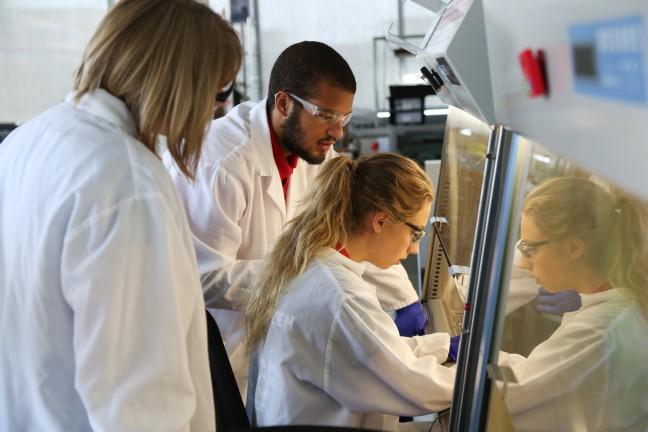Three University of Wisconsin graduates want to improve STEM learning at their high schools.
The 2017 Knowles Teacher Initiative Fellowship aims to increase STEM learning in high school students, and announced over 300 winners of the fellowship, including UW alumni LJ Neumann, Sean Moore and Sarah Timmler.
According to the Knowles Science Teaching Foundation website, teachers chosen for the fellowship have teaching methods that encourage STEM learning in their high schools.
Neumann, a chemistry teacher, said subjects based in STEM careers are growing. By continuing STEM teaching, he said students will be more prepared for those careers and will allow students to think critically.
“Science, engineering, math: they all help students engage in the world in a different way,” Neumann said.
Neumann said he wants students to be engaged in the scientific process and have hands-on activities. Having students asking questions and analyzing data to create evidence is important.
Moreover, he wants to “dive deeply” into scientific processes which includes “working outside a textbook.”
“Every day I find something new that I can work on and improve. And that daily reflection and weekly reflection and monthly reflection is super important to moving your practice forward,” Neumann said.
He hopes to continue his learning as a teacher through daily reflection and have students know why they’re learning what they are.
Neumann said earning the fellowship has offered him nothing but support.
Another fellowship recipient, chemistry teacher Sean Moore, said he believes STEM subjects help students create an argument.
“Content is important, yes, but they’re getting really applicable skills, like learning how to interpret some data,” Moore said.
Moore said STEM subjects can prepare students for all types of careers and can give students the type of skills they need to work well in various careers.
Besides teaching skills, Moore said he hopes students will learn to build their own scientific model and make their own experiments or find supporting data.
As he continues his teaching, Moore wants to stray away from traditional teaching methods like notes and lectures, and teach on an inquiry-based level. He wants his students to be the “drivers of their learning.”
Moore attributed his success as a teacher to his undergraduate and graduate careers at UW.
“The education program at UW set me up for success,” Moore said. “The secondary education masters program… I felt like I was walking among the giants.”
Sarah Timmler, a biology teacher, said she believes STEM subjects have an influence over daily aspects in people’s lives and can help students grow as individuals, as it will teach them a skill set to make their own decisions.
STEM, she said, affects anything from our health to our social interactions.
“Taking STEM not only impacts our understanding of the world and how we interact with it, but also how we make sense of things and think critically about information provided to us by the media and politicians,” Timmler said. “It influences the decisions we make.”
Timmler wants to bring “testable scientific discoveries” into the classroom that directly influence and relate to students’ lives because she believes this can help encourage their learning.
In order to create a better experience for students, Timmler said collaboration between teachers is necessary because it creates “professional development practice.”
“We need to engage in critical friend groups of analyzing student work, assignments and practices to improve together based on what we notice in student learning,” Timmler said.


